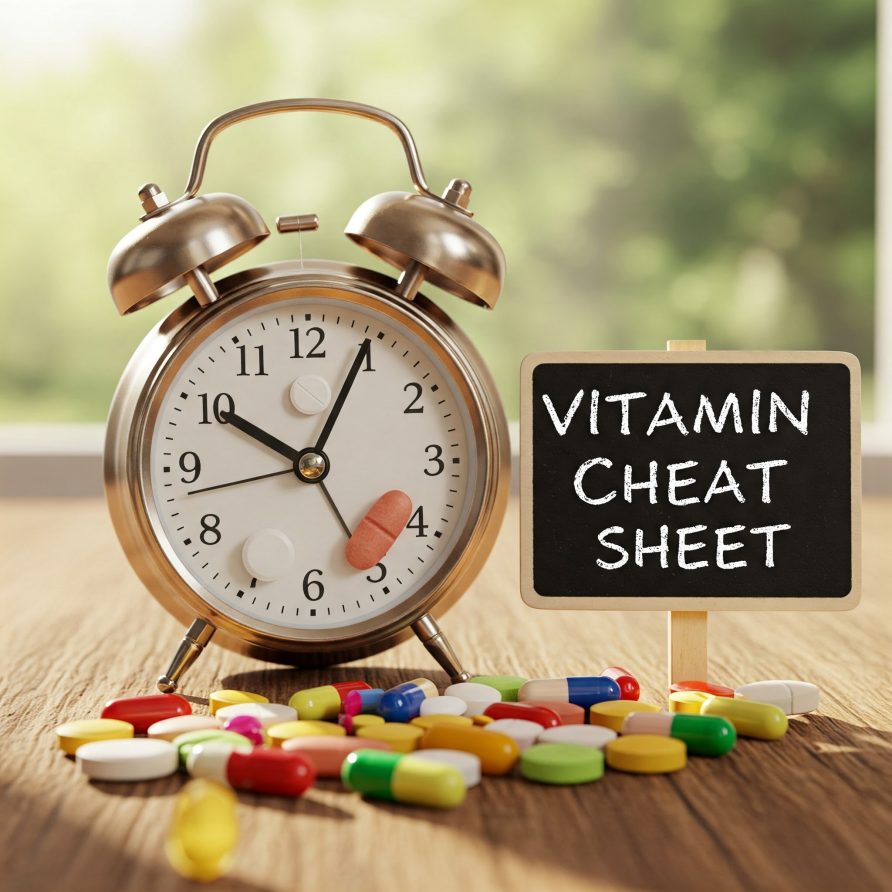
If you’ve ever stood in the supplement aisle feeling overwhelmed by the endless rows of vitamins, you’re not alone. I used to do the same thing—grabbing whatever sounded good, without really knowing what my body actually needed.
It wasn’t until I started researching that I realized vitamins work best in certain combinations and that some don’t play well together at all.
So, if you’re wondering what vitamins to take and how to pair them for maximum benefits, let’s break it down in a simple, no-nonsense way!
Why Supplementing Matters
Ideally, we’d get all of our nutrients from food. But let’s be real—life gets busy, and even with the healthiest diet, gaps happen.
Factors like stress, workouts, and even the quality of our soil impact how much nutrition we’re actually getting from food. That’s where supplements come in—to fill in the missing pieces.
The Best Vitamin Combinations
1. Vitamin D + K2: The Bone & Heart Power Duo
Vitamin D helps with calcium absorption, but without K2, that calcium can end up in your arteries instead of your bones—yikes!
Best Pairing:
- Vitamin D3 (preferably 2,000-5,000 IU daily)
- Vitamin K2 (MK-7 form for better absorption)
When to Take: With meals containing healthy fats for better absorption.
2. Iron + Vitamin C: The Energy Boosting Combo
Iron is crucial for energy and red blood cell production, but it’s tough to absorb. That’s where vitamin C comes in!
Best Pairing:
- Iron (if you’re low or prone to anemia)
- Vitamin C (boosts absorption)
When to Take: In the morning, on an empty stomach if possible (unless it causes nausea—then take with food). Avoid pairing with calcium, as it blocks iron absorption.
3. Magnesium + B6: The Stress & Sleep Support Team
Magnesium is known for relaxation and muscle recovery, while B6 helps your body use magnesium more effectively.
Best Pairing:
- Magnesium (glycinate is great for sleep, citrate for digestion)
- Vitamin B6 (helps regulate mood and stress)
When to Take: At night to support relaxation and restful sleep.
4. Omega-3s + Vitamin E: The Brain & Heart Duo
Omega-3s (like fish oil) reduce inflammation and support brain function, while vitamin E helps prevent oxidation of the fatty acids, keeping them effective.
Best Pairing:
- Omega-3 (EPA & DHA from fish oil or algae-based sources)
- Vitamin E (as mixed tocopherols)
When to Take: With a meal that contains fat for better absorption.
5. Zinc + Copper: The Immunity Balancer
Zinc is fantastic for immunity, but taking too much can deplete copper, which is also essential for overall health.
Best Pairing:
- Zinc (helps immune function and wound healing)
- Copper (keeps levels balanced)
When to Take: With food, but away from iron supplements, as they compete for absorption.
What Not to Take Together
Not all vitamins get along. Here are a few combos to avoid:
❌ Calcium & Iron: They compete for absorption, so take them at different times of the day.
❌ Zinc & High-Dose Iron: Too much iron can block zinc absorption.
❌ Magnesium & Calcium Together in High Doses: They can interfere with each other’s absorption, so space them out.
Personal Tip: Simplify Your Routine
I used to take all my vitamins at once, only to find out I was canceling out half their benefits. Now, I space them throughout the day:
☀️ Morning: Vitamin C + Iron (on an empty stomach) + Omega-3s
🥗 With Lunch: Multivitamin + Vitamin D & K2
🌙 At Night: Magnesium + B6 (for relaxation)
This simple schedule has made a huge difference in my energy, sleep, and recovery.
Disclaimer: I am not a medical doctor. This post is based on my own research and personal experience. Always consult with a healthcare professional before starting any new supplements.
